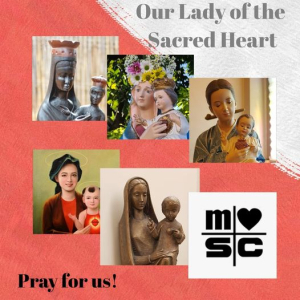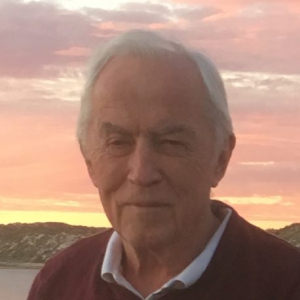Peter MALONE
Feast of Our Lady of the Sacred Heart.
Feast of Our Lady of the Sacred Heart.
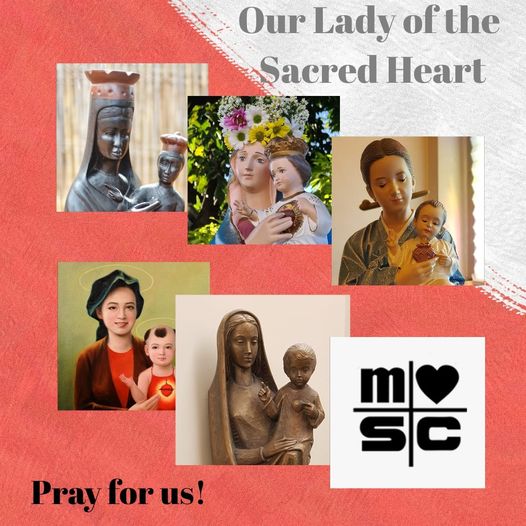
Some international pictures to remind us.
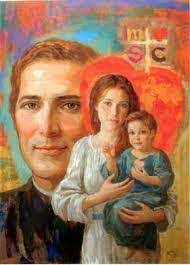
The purpose of this devotion, according to Father Chevalier, is to honour Mary "in her relationship of ineffable love which exists between her and the Sacred Heart of Jesus."
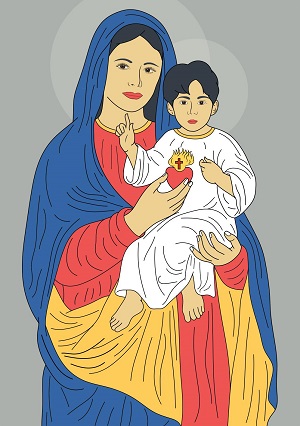
"Our Lady of the Sacred Heart" refers to a devotion that honors Mary's role in the mystery of Jesus' Sacred Heart and her connection to the love of God, particularly in her role as Mother of the Church. The title highlights Mary's intimate relationship with Jesus and her role in leading people to his heart, which is seen as the source of God's love and grace.
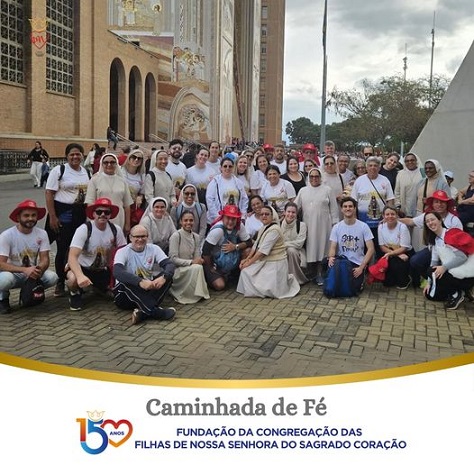
Fr. Chevalier's devotion to Our Lady stands out in his life and his work. His 'vision' was that of the Sacred Heart, or Christ in his love, and the world in need. Mary would find her place naturally within this vision; close to the heart of her Son, and able to appeal to him for the world in need.
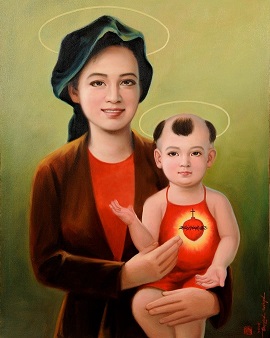
Interesting to note that the second and third paragraphs are the AI generated answers on Google to the enquiry: Our Lady of the Sacred Heart meaning.
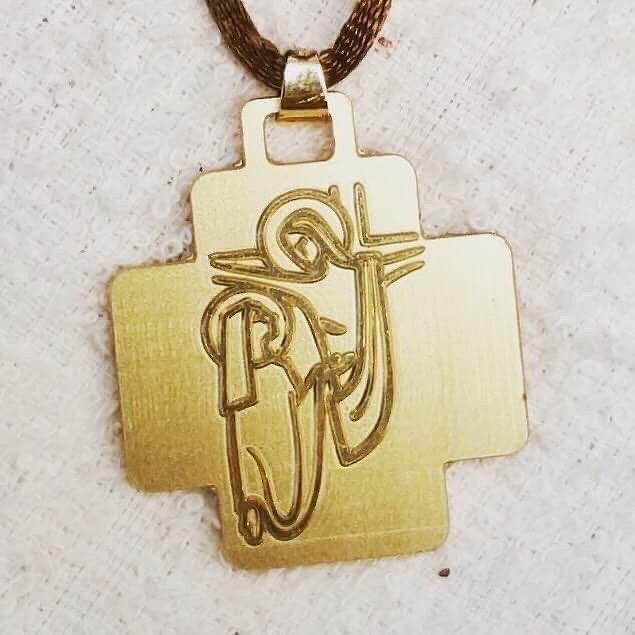
RIP, Paul Compton
RIP, Paul Compton
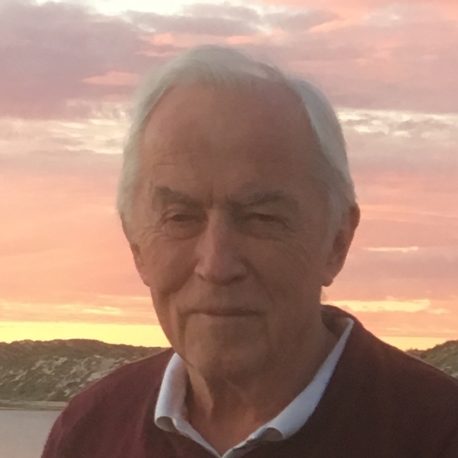
We received the very sad news last night that Paul Compton died at 5:30 yesterday.
Paul spent some of his early years sharing MSC life. Then he generously shared his insight, intellect, and many gifts over the years as a member of the MSC Parishes Committee, on the National Council of the Lay Chevalier Family, and through a long and faithful ministry at St. Brigid Parish, particularly through music.
Paul lived and shared our charism. His warmth, dedication, and spirit of service will be fondly remembered and deeply missed.
We give thanks for the gift Paul was to so many, and we hold Therese and the Compton family in our prayers.
May Paul rest in peace.
Funny Birds
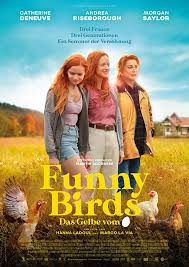
FUNNY BIRDS
France/Belgium, 2024, 97 minutes, Colour.
Catherine Deneuve, Andrea Riseborough, Morgan Saylor, Naima Hebrail Kidjo, John Robinson, Joseph Ollivennes, Ken Samuels, Maria McClurg.
Directed by Hanna Ladoul, Marco La Via.
Funny Birds is a funny title, funny with humour, but also funny peculiar. Does it refer to the chickens that Laura, Andrea Riseborough, has rescued after they are too old for the big chicken runs and fosters them, collecting the eggs and marketing them with her own brand? Or does it refer to Laura herself, her young daughter Charlie, who is at college and comes back to look after her mother and work with her, her mother becoming ill?
And, there is the question of the presence of Catherine Deneuve in this film. And she is a very welcome presence. We remember that Catherine Deneuve has been headlining films since 1964, the just over 60 years. And, on checking her age, she was 79 when she made this film. And it is not generally the kind of film that she appears in. This is a small film, quiet, a focus on women and empathy for them, and a role in which she can enjoy herself, a character who was at home in the 1960s but is still at home in the 2020s. In many ways she is quite a funny bird.
In fact, this is a French or Belgian coproduction, filmed in Europe, English language, but an American story, the chicken farm in New Jersey.
The plot is fairly straightforward, Laura and the chickens, her becoming ill, her daughter, Charlie, Morgan Saylor, coming home to stay with her, work with her, look after her. There are two sympathetic neighbours who help with the distribution of the eggs, the wife pregnant. The main complication, quite a complication in fact, is an epidemic of bird flu and how to handle the situation, conceal the hens from the local sheriff and his by-the-book offsider.
And, then, there is Solange, Catherine Deneuve, suddenly turning up quite unexpectedly to the audience and to Charlie and her mother, Solange abandoning Laura when she was very young and in the world with more than a touch of New Age explorations. But, Solange enters into the life of the farm, fascinating to see Catherine Deneuve out there with the chickens, working in the garden, gradually bonding with small detail with her daughter and granddaughter plus a whole lot of those New Age traditions, including medicinal cannabis.
One could say that there is no major reason for seeing Funny Brids but, should you come across it, and are interested in a sympathetic/ edmpathetic focus on the story on three generations of women, it is quite enjoyable.
- The title, the reference to the chickens, their background, cared for by the women? The women as funny birds?
- French-Belgian coproduction, an American story, some French background? The New Jersey setting, the farm, the countryside, the neighbours? But filmed in Europe? The musical score, the songs?
- The situation, Laura, her age, caring for the chickens, rescuing the old hens, caring for them, in the house, in the barn, outside, feeding them? The eggs, packing them, her brand? Making a living?
- The arrival of Charlie, relationship with her mother, the tensions, her mother ill, coming to care for her, work on the farm? Her studies, the allusion to her father, his interest in business, the business studies? Her age, her boyfriend and his visit? Her commitment to working with her mother?
- The film’s focus on the details of work on the farm, with the chickens, the eggs, packing, distribution, the garden, the vegetables? The details of life on the farm, the mother and daughter, home life, meals and cooking, the support?
- Laura and her illness, the visits to the doctor, losing her hair, Charlie and the discussions about the wig, cutting her hair, shaving her mother’s head, shaving her own? The growing bonds between the two?
- The arrival of Solange, the presence of Catherine Deneuve, age, background, travelling the world, the theories, sustaining, feminist…? Charlie’s puzzle, never having heard of her grandmother, her mother’s reaction, angers, trying to ignore Solange?
- Solange, her personality, no background explanations, allusions to her past, helping Laura, working with Charlie, hands on with the work, the change of attitude, the growing bonds between them, enjoying each other’s company, the meals, helping Laura?
- Joanna and Sebastin, neighbours, helping with the distribution of the eggs, Joanna pregnant?
- The issue of the bird flu, the decision to hide the birds, but not tell Laura? Newspaper headlines, concealing them from Laura? Sebastian, unwilling to help, and Joanna and her pregnancy, continuing to help, ultimately becoming too much?
- The arrival of the sheriff, Solange and her approach, his serious deputy? Solange, the dates, stopping him coming into the house?
- The birthday celebration, the cake, the dancing? The aftermath? Solange disappearing?
- The end of the epidemic, the chickens coming out again, join and the birth of the baby?
- The postcard from Solange, her sending the letter to the sheriff confessing to selling the chickens to get the money, saving Laura and Charlie from exposure? The postcard just with the destination – and the joke about getting a passport to go there?
- Laura, recovery, happiness in her life and work, Charlie and her studies, hope for the future?
Lilo & Stitch/ 2025
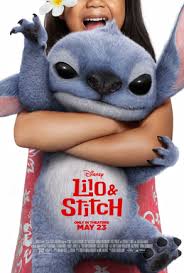
LILO AND STITCH
US, 2025, 108 minutes, Colour.
Maia Kealoha, Sydney Elizabeth Agudong, Chris Sanders, Zach Galifianakis, Billy Magnusson, Courtney B.Vance, Amy Hill, Tia Carrere, Kaipo Dudoit, Hannah Waddingham, Jason Scott Lee.
Directed by Dean Fleischer Camp.
What is needed these days to make a successful Disney feature for young children? Lilo and Stitch suggests some of the answers. During the 90s, classical stories were popular. We think of Beauty and the Beast, a comic version of Aladdin and The Lion King.
Who are Lilo and Stitch? Stitch is introduced to us first. He is genetic experiment 626, produced by a mad scientist in a galaxy far, far away. The Council banishes him to earth. But, just as we are settling into a mini version of some star wars, the mood changes completely.
We are then introduced to Lilo. She is a young Hawaiian girl who lives with her sister, Nani, with whom she is always quarelling. When Nani allows Lilo to buy a dog, whom does she find in the pound, terrifying all the stray dogs, but Stitch? She has to have him. Together, Lilo and Stitch are able to rustle up quite a bit of mischief and some slapstick comedy.
So, it looks as though we need something from outer space, something alien and a close encounter as well as something slightly exotic here on earth which will finally give us a warm glow as everyone is reconciled, Stitch saves Lilo and the day and we appreciate what it is to be nice and human.
And, of course, this is what happens.
The film-makers stress that the quality that really appealed to them in Hawaii was what the locals call 'ohana', which means a sense of family. Lilo has to learn to love Nani so that they will not be a broken family. Stitch is all alone and what he needs to learn is to belong to a family.
Along the way, we are treated to some exotic characters from the galaxy, including Pleakley, a one-eyed, three-legged expert on Earth and Cobra Bubbles, an ex-CIA operative who has become Lilo's social worker. Nani's boyfriend, David, is a perfectly ordinary surfer who does fire-eating stunts which literally bring part of the house down.
What is attractive about Lilo and Stitch is the use of water colour backgrounds and drawings rather than computerised characters. Lilo idolises Elvis, so there is a pleasing soundtrack of his songs.
In fact, the above is most of the review written for the 2002 animated version -but it also serves here. This 2025 version, is live-action, but following the original plot in great detail. (And, there was the popular television series, 67 episodes, from 2003 to 2006.) And, instead of just voices previously, we have the strong cast of live actors, Maia Keloah a very feisty Lilo and the charmingly energetic Sydney Elizabeth Adugong as her sister, Nani. There are very broad comic turns from Billy Magnusson, especially, and Zach Galifianakis when the two space creatures become human. Tia Carrere who voiced Nani in 2002 now appears as the welfare supervisor. Courtney B.Vance is the CIA agent.
This version is 20 minutes longer than the original but it seems to have been embraced enthusiastically by young viewers in America and in Australia (as well as their parents who were young for the 2002 version?).
Skin Trade
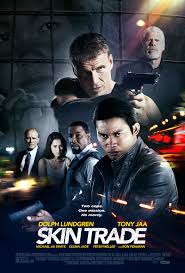
SKIN TRADE
US, 2014, 96 minutes, Colour.
Dolph Lundgren, Tony Jaa, Michael Jai White, Ron Perlman, Celena Jade, Peter Weller.
Directed by Ekaschai Uekribgtham.
Skin Trade is an action film focusing on human trafficking, especially in Asia.
This is very much a Dolph Lundgren film, not only acting in the central role but producing and cowriting. He has a history of action films. Also top billed is Thai martial arts actor, Tony Jaa, given the opportunity to develop a character in this film as well as the opportunity for many fights, including with Lundgren himself.
In many ways, that sets the tone of this dramatising of issues of human trafficking.
There are, some frightening visuals of the trafficking, a young girl in Cambodia answering an advertisement, full of hope, taken over by the criminals, drug, caged. Later in the film there is a sequence, ugly and dramatic, of rows and rows of cages with young girls trapped squalidly in them. On the other hand, there are the clubs in Thailand where these girls have to dance provocatively as well as the prostitution. At the end, there is information about the statistics of human trafficking.
However, it is very much an action film, Dolph Lundgren as a New Jersey detective, trying to track down a trafficking family led by Ron Perlman, through his sons, operatives in Asia, the younger son a student in the US, forced by his father to be violent but ending up killed when the gang go to a ship at the dock, raided by the police, and discover the dead bodies of many girls.
The detective is shot, his house burned down, his wife and daughter killed. Obsessed, he exits from hospital, gets his way to Cambodia, gets all kinds of information, tracking down the traffickers. However, he is under suspicion by the ties, which means that Tony Jaa, police, has to keep tracking Lundgren, eventually fighting with him.
As expected, there are lots of fights, shootouts, gruesome killings, and a final confrontation with the trafficking head villain – and the open end that Lundgren’s daughter was taken alive and has been sold into the trafficking world. A clear sign for a sequel – but there was none.
- The title and expectations? Human slavery, international, Europe, US, Cambodia and Thailand?
- Settings in Cambodia, the countryside, in Thailand, Citi sequences, countryside? The US, the American city, police precincts, the docks…? Musical score?
- Human trafficking, the girl in Cambodia, confident, the invitation, the bus, taken, drugged, imprisonment? The various sequences showing so many girls imprisoned, caged?
- Dolph Lundgren, producing, cowriting, starring? His career? Strongman? Detective, wife and daughter? Working with the police, the raid? The docks, the confrontation with give each, the death of his son, the revenge on his wife and daughter? The fire, his being shot, in the hospital, leaving, to Thailand?
- The trek of each family, Victor, European background, Serbia, Russia, his sons, the celebration with his sons, their work, especially in Asia, ruthless? Favouring his son? At the docks, waiting for the shipment, the dead girls, the attack, his son proving himself, dead? Victor getting himself to Asia? His contacts, blackmailing, protection?
- Police and detectives in the US, the discussions about the human trafficking, Costello, his position, involvement? Read, actively involved?
- The credibility of Nick Cassidy and his quest, his injuries, getting to Asia, the connections, information, it into Cambodia, his skill in getting information, his perseverance, to find the drag of each son? His being pursued by Tony?
- Tony Jaa, his reputation, martial arts, his character, with the police, confrontation with the traffickers? His fight sequences? His relationship with his girlfriend, her working in the club, the sequences in the club, the girls dancing, prostitution, clients? His suspicions of Nick Cassidy, pursuing him, the various fights?
- Nick, tracking people down, the clubs, his violence, shooting the manager, rescuing the girls, the fight with the younger son?
- The betrayal by the detective? Fights, death?
- The reconciliation with Tony, their working together, the girlfriend, her being captured, under siege, though, at the airport, his of the sons and their deaths, the final confrontations, fights, helicopter, the rescue?
- The threat to Nick, but his daughter had been taken from the fire, now part of trafficking?
Clown in a Cornfield
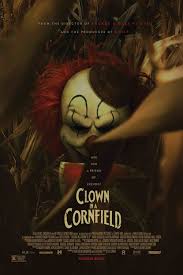
CLOWN IN A CORNFIELD
US, 2025, 96 minutes, Colour.
Katie Douglas, Aaron Abrams, Carson MacCormack, Kevin Durand, Will Sasso.
Directed by Eli Craig.
An arresting title. However, while it is true in the early part of the film, by the final confrontations and climax, there are very many clowns in the cornfield.
There is an interesting central plot of interest to audiences. However, it needs to be said, that like many of the horror films of the first half of the 2020s, especially those with an emphasis on slashing and gore, the death sequences are very graphic, the kind that action fans with horror tastes applaud but which many audiences would in their eyes from.
With that warning, the focus of this review is on the plot. The film opens in the 1990s, the party, young people drinking and laughing, one of the party going out into the cornfield and being confronted by a murderous clown, Fendo. So, there are the visuals of the cornfield, mysterious, sometimes sinister. There is also the closed-down factory for the production of corn syrup. The logo for the factory is Frendo, the clown.
The main action of the film is in the present. Teenager Quinn and her doctor father move to the town of Kellie Springs, Missouri, on the death of her mother. Tension between father and daughter. At school, she makes many friends, especially the son of the Mayor. The on is very strong on tradition, especially with the parade with floats featuring a giant Frendo. During the parade, one of the floats goes up in flames. The Mayor, Kevin Durand, is the promoter of the tradition. He is backed by the local sheriff.
The youngsters have their parties and, once again, a clown emerges from the cornfield and their deaths. In fact, there are quite a number of the characters, drinking, running away, afraid, and a building number of slashing killings. Before many of the killings, the intended victims open an ominous Frendo music box, signalling death. Quinn’s father becomes involved, having to treat some of the wounded Frendos but uses his medical skill to come to the rescue.
Quite a lot of tension, young people, the chases, hiding, defending themselves – but, the interesting aspect is the revelation that the Mayor and the sheriff are leaders with so many of the citizens dressing up as Frendo viciously and attacking the younger generation, including the children, condemning them for not being loyal to the traditions. (The film was released in the first year of the second Trump administration – and the audience watching identifying the older generation and their attitudes with the overwhelming support of Trump in the 2024 election.)
Blue Story
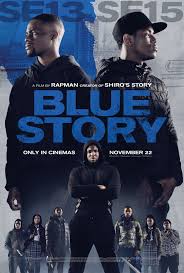
BLUE STORY
UK, 2019, 91 minutes, Colour.
Stephen Odubola, Micheal Ward, Eric Kofi Abrefa, Karla-Simone Spence, Rohan Nedd, Sean Sagar, Kadeem Ramsey..
Directed by Rapman (Andrew Onwubolo).
A number of British films and television series, documentary and docudramas, focus on gangs in different areas of London. And the gangs are black gangs. This is one of those films, very much directed towards the younger audience, the target audience of black youth in London, as well as their parents.
The film has been directed by Andrew Onwubolo, an MBE artist and musician, who has the name, Rapman. He has written the screenplay, and appears as a narrative character throughout the film, especially with, as his stage name suggests, a great deal of rap lyrics. Again, though directed towards the younger target audience, many older audiences will appreciate his presence, the skill of the rap, its commentary on characters and action.
The film is set in areas of London, especially Lewisham and Peckham. They have their various gangs. Some of the characters live in Deptford which is looked down on.
The film focuses on a young man, Timmy (Stephen Odubola) and his mother, transferring him to a different high school, away from his friends, especially one who is particularly tough, Killy. At the new school he makes a number of friends, especially bonding with Marco (Micheal Ward) who has an older brother, tough leader of a gang. The years pass, friendships develop, especially timber with the young girl at school, Leah.
But, towards the end of time at school, the friendship is tested, Timmy rather restrained and not wanting to become involved, Marco is influenced strongly by his brother, problems with Timmy coming from Deptford, the different gangs, the emergence of Killy and his gang.
The plot is quite complex with all the politics of gang leadership, the raids and attacks on other gang members, sometimes at night, sometimes in public, a number of deaths which test loyalties.
While Timmy and Leah become involved, falling in love, hopes for the future, Marco attacks them, hitting Leah, her falling, dead. Marco goes to jail. There are a number of incidents, fights, and Marco’s brother injured and becoming a paraplegic.
Years pass, Timmy, affected by the death of Leah, deadly enmity towards Marco, also becomes a gang leader, leading up to confrontations, possible reconciliations, Marco with memories of his family, prison, going to firebomb a van in which Timmy is trapped, deciding to throw the flames.
The central actors, who have had substantial careers in film and television, are engaging, persuasive, audiences becoming dismayed at what happens to them and their behaviour.
Which means then that this is a serious drama, rap message, the action on the nature attractions of gangs and warfare, but the futility of the violence and deaths.
Thunderbolts*
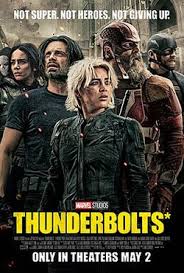
THUNDERBOLTS*
US, 2025, 126 minutes, Colour.
Florence Pugh, Sebastian Stan, Julia Louis-Dreyfus, Lewis Pullman, David Harbour, Wyatt Russell, Hannah John-Kamen. Olga Kurylenko, Geraldine Viswanathan, Wendell Pearce.
Directed by Jake Schreier.
A recent listing declares that there have been 36 Marvel Studios films over almost 20 years. Thunderbolts*is the latest and seems to have appealed at the box office.
The Marvel Studios superhero team has been The Avengers – their working together to save civilisation, a number of back stories and further developments. So, the question: who are the Thunderbolts? This is not an action story showing them working together. Rather, it is their origin story of their moving to work together. In fact, the characters have appeared in a variety of Marvel films, as well as in the S*H*I*E*L*D television series. Several of them have appeared in the Captain America films or in the Antman films.
So, who are they now and what is the mission? (And an indication to audiences who rush out during the credits, there is a longer than usual post-credits sequence indicating the future.)
First to be introduced is Yelena, a strong presence with Florence Pugh. She is an assassin, getting tired of her work, controlled by a political mastermind, Valentina. Julia Louis Dreyfus was Veep, but here she is even more powerful, facing the Senate enquiry, masterminding laboratories for developing weapons and reconditioning human beings. Clearly, Julia Louis Dreyfus is thoroughly enjoying this sinister and commanding role.
Then there is return of Bucky Barnes, Sebastian Stan, familiar from the Captain America films, here seen in a political context, confronting Valentina. Then we are reintroduced to Alexi Shostakov, David Harbour, prominent former Russian agent, now down on his luck driving taxis. There is Ghost (Hannah John-Kamen) who can appear and disappear through walls, from the Antman films. And, again from Captain America, a possible Captain, John Walker, Wyatt Russell, supremely self-assured.
Then there is Bob, a reconditioned human, Lewis Pullman. He is a mysterious presence, lacklustre one minute, energised the next, – and the character from Marvel comics, The Sentry.
The first part of the action shows each of these characters in action, but, with Valentina’s sinister plans, a great deal of conflict and fighting with each other. When they eventually do begin to understand each other, see how they are being controlled by Valentina, and the concern about Bob, they join to become an active force, building up to an action-packed confrontation.
In many ways, this group consists of a rather unprepossessing lot. Anti-heroes? Not many superpowers, rather relying on determination, intelligence, physical force, available weapons. And, by and large, they don’t radiate immediate charm! So, it will be interesting, as well as a challenge, to move into their next film, working together as a unit, assertive, and, with the*in the title, moving towards being new avengers.
The director, Jake Schreier, has, up till now, had a strong career in music videos and television series.
- Marvel Studios, the Thunderbolts comics, this film as the New Avengers introduction rather than a thunderbolts adventure?
- Marvel Studios and superheroes, action adventure, futuristic, the New York setting, destruction of New York, Washington, the variety of centres and experimentation, signs? Special effects? Musical score? Theme song?
- The range of characters, the introduction to each, their interactions, Bob as the common bond, Valentina, politics, impeachment, hearings, her control, experiments, budget, setting the base for New Avengers films?
- The introduction to Yelena, assassinations, controlled by Valentina, top of the building, falling, Parachute? Getting out from assassinations? The encounter with Alexi, the taxis, his squalid situation, his past career, the apartment, costumes? Relationship with you Lena, her dead sister?
- Audience knowledge of Bucky Barnes, Winter Soldier, the past films, in politics, the interview, concern about Valentina? The socials?
- John Walker, here character but yet,, his family, the possibility in the past of his being Capt America? His role in the team?
- Ghost, her presence, personality, contribution, less a member of the team?
- Bob, the comic character, simple, affable, his past, ambitions, the transformation, his becoming the Sentry/Floyd? Participation with the group, the influence of Valentina, is mixed experiences, dangerous, affable? The resolution?
- Valentina, the influence of her assistant, advice, yet prepared to betray her? The political background, the Senate enquiries and interrogations, her influence, control, plans?
- The building up of the new team, not so much with superpowers, the contrast with the Avengers, the final action sequences, CGI, stunt work, battles, the team winning, the role of Bob, the defeat of Valentina?
An Tairseach – a sabbatical for our time!
An Tairseach – a sabbatical for our time!
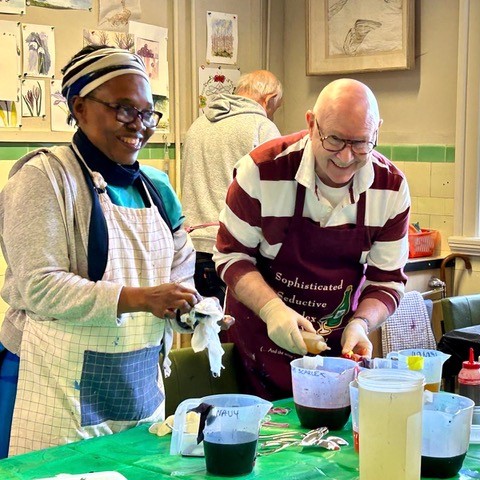
John Walker MSC

A chance meeting with Timothy Radcliffe, OP, in early 2024 in Australia and a shared discussion on cosmology led me to An Tairseach, Ireland, for a ten-week sabbatical focused on cosmology and ecology, with our central text being Laudato Si’.

An Tairseach (Gaelic = the threshold) was a vision of the Dominican sisters emanating from their Chapter in 1992 to establish an organic farm on their 70 acres in Wicklow, south of Dublin, along with an ecology centre overlooking the Irish Sea. It would encompass the unfolding story of the universe, as documented by Brian Swimme and Thomas Berry, and in more recent times, Pope Francis’ 2015 seminal encyclical Laudato Si’. The works of Teilhard de Chardin were also prominent, including "The Divine Milieu" and "The Phenomenon of Man." The ‘threshold’ reminds us of the fact that, in response to the looming environmental breakdown, humanity has the potential to create an ecological age, and that we are, as Thomas Berry famously wrote, ‘between two stories’.
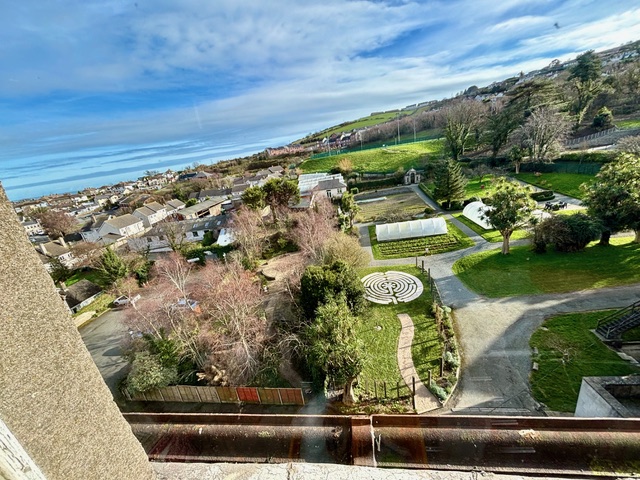
The spring program included a total of sixteen participants, featuring a surprising mix of young and old, as well as lay and religious individuals from Australia, New Zealand, Malawi, Nigeria, the USA, and, of course, some locals. Each morning, we gathered in the cosmic garden for our morning prayer and ritual. As seen in this photograph, a spiral is formed from bricks, each representing millions of years, culminating in 13.8 billion years since the great ‘flaring forth’ (Big Bang).

And at significant points in the unfolding story of the universe, rocks are placed, and it is astounding that in that visual image before us, Jesus was born a mere 2000 years ago!

The program's objective is to familiarise participants with our evolution over nearly 14 billion years, as discovered by contemporary science; to explore its implications for understanding our place in the universe; to delve into the theological implications of this new cosmology; to listen to the mystics; to reflect on themes from the Celtic Tradition; to examine our images of God while critiquing our present world order; and to explore possibilities for a sustainable lifestyle.
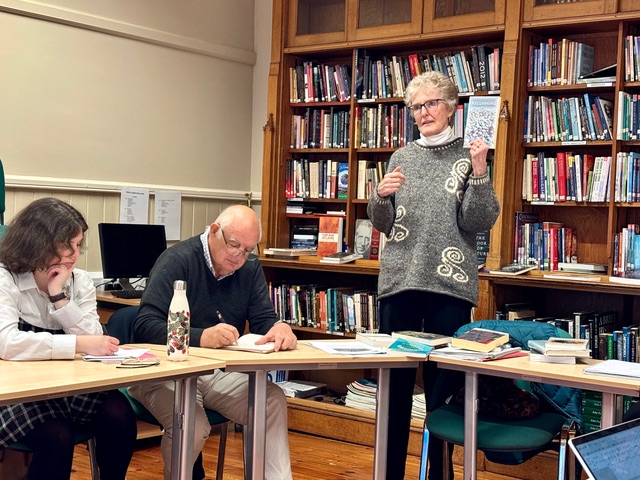
To help us engage with these objectives, the program is delivered through lectures led by the An Tairseach team and guest lecturers, including Diarmuid O’Murchu msc, Philip John Newell, Niamh Brennan, John Feehan, and others; art, movement, ritual, prayer, weekly cosmic walks in nature, yoga, walking the labyrinth; and visits to sacred places, such as Glendalough, the site of a medieval monastic community founded by St Kevin. John Feehan is an Irish geologist, botanist, author and broadcaster, and apart from being a member of the Royal Irish Academy, John was also one of Pope Francis’ principal consultants on the topic of biodiversity for Laudato Si’.

We were fortunate to have John with us for several days, during which we explored the evolutionary geological history along the Irish Sea shoreline and delved into the science of botany using our electronic microscopes in the conference room. As a result, we gained an entirely new perspective on creation!
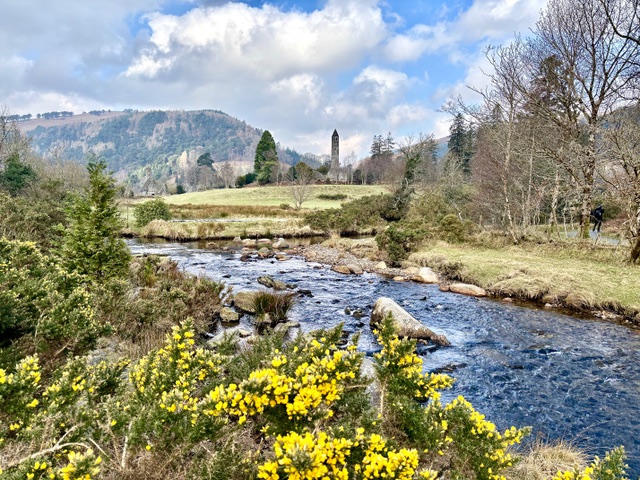
Over the ten weeks, some of the topics presented included an introduction to the universe story; exploring our ecological footprint; theology in context; patriarchy; ecofeminism; cosmology; Celtic spirituality; biblical theology from an evolutionary viewpoint; mysticism; Laudato Si’ and Church teachings; creation, evolution and faith; incarnating the human; theological implications; action on climate justice; the Bible and ecology; and evolutionary theology and care for creation.
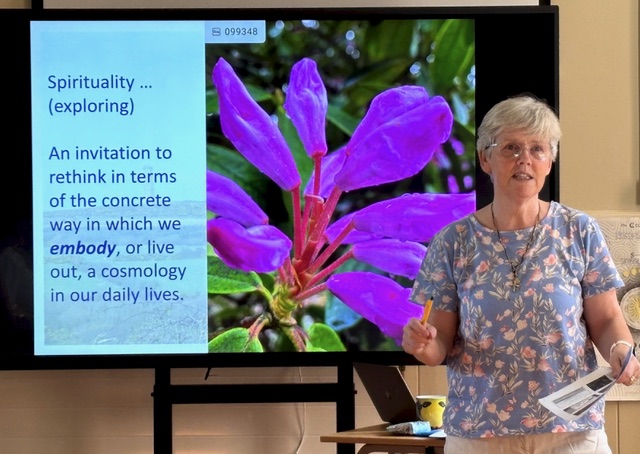
During our ten weeks together, we developed a bond, and our weekly ‘cosmic walks’ in the stunning County Wicklow countryside were certainly moments to cherish, as shown in this photo, walking along an avenue of Lime trees in the Killmacurragh National Botanical Gardens.
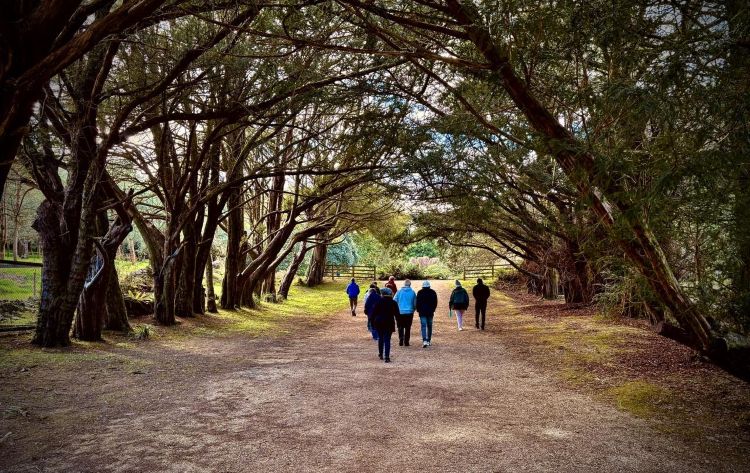
And, finally, the group photo before departure in the cosmic garden!
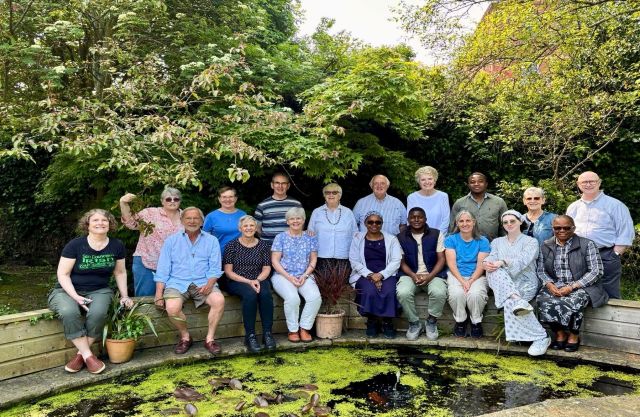
Into the future:
Heart of the Man
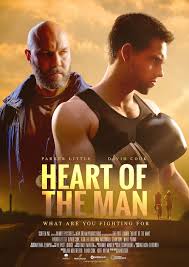
HEART OF THE MAN
Australia, 2024, 85 minutes, Colour.
Parker Little, David Cook, Vito Leo, Roxanne McDonald, Sean Dow, Matt Young, Winnie Mzembe, Tyrel Dulvarie.
Directed by David Cook.
A small-budget film from Queensland, written and directed by actor, David Cook, an effective drama but not widely seen.
There is a Brisbane setting, the focus on the indigenous community in the city, especially focused on the world of boxing, training, gymnasium, the hopeful winning titles, disappointments in the past. There is also a focus on the Arts Theatre.
The focus is on 18-year-old Chris, a very effective performance, believable, by Parker Little. We see him in training for a boxing title, coached by his father, Sam, riding his bike while his son runs, going to the gym. The audience is shown various newspaper clips about Sam having a possibility for a title fight but this is not currently about.
There is a back story about Sam, his marrying a white wife, daughter of the head of boxing, send drinking, and his wife been killed in a car accident. He is full of the rooms, some fun times attending the church self-help group. But he is transferred all is ambitions on to his son who, in fact, is skilled at boxing, but is doing the training only to make his father happy.
However, this is not so much a film about boxing is about coming of age and sexual orientation, the audience being alerted when at the gym, Chris notices one of the trainees, an indigenous man, Jamie. Chris had also assorted a white man, gay, calling him a freak. When a close friend of Chris takes into the Arts Theatre, he discovers the manager is the man that he punched. However, the manager sees into Chris, talking with him, Chris apologising, offering him a job, Chris finding himself at home in the theatre as well as in the gay culture.
On the one hand, this is a story of Chris finding his own identity, supported very much by his indigenous grandmother, and his making choices to stand up to his father, on the other, there is a vengeance theme involving Sam’s father-in-law, Sam’s business manager, and a bounty put out on Sam’s life. The story is happily resolved there is violence and upset in the of the story, eventually moving towards a peaceful ending.
Heart of the Man could be a helpful film parents and gay-oriented children to see and discuss.
- The title, as explained by the father, the truth of the heart, honest identity and acceptance?
- The Brisbane setting, homes, and gyms, bars, the arts Theatre? The musical score?
- The aboriginal community in Brisbane, families, relationships, the boxing world, titles, the contrast with the theatre world? The generations? What-indigenous families?
- The introduction to Chris, his age, running, pushing himself, tired, the encounter with Joey and bumping him, calling them freaks, punching? The screenplay going back in time, Chris at home, with his father, Sam, his father catching him, riding the bike, Chris and his running? The gym the training? The possibility for the title fight? His father wanting it, the indications from the newspapers of the past, Sam’s possibilities, not achieving, the death of his wife, his hopes for his son?
- Chris, the death of his mother, the visits to his grandmother and her support? At the gym, the encounter with Jamie, audiences alerted to issues of sexual identity? The effect on Chris?
- His friendship with Marcus, Marcus and his friend, sexuality, bisexuality, Chris a surprise? The taking him to the theatre? The impact of the performance, the actors and issues of identity, honesty, love? The effect on him? And the encounter with Joey and his friend, the surprise, shame?
- Return to the theatre, the apology to Julie, Joey taking on, the discussion, implications of sexuality, offering him the job, Chris returning, sweeping up, going on stage, the week, Christine, the dancing? Chris and honesty about himself?
- The background, Sam and his marrying his wife, quiet, daughter of the boxing manager? His drinking, the accident, his responsibility for the death of his wife? His father-in-law and the enmity? His ambitions for boxing title, wanting now for his son? His visits to his mother and conversations? Her challenges?
- Bentley, the manager, friendships, arranging the bout, Sam with the gun forcing him, the manager and his henchmen, the pressure on Bentley to destroy Sam? And the hold over his mother? Bentley at the bar, his dilemma, friendship with Sam, going to the house, the gun, confronting him, the memories of the past? The head arriving, (the black and white flashbacks of Sam and the boss and training)? The threats, the blindfold, the henchmen to shoot Sam? The boss of the change, venting his anger and memories of the past, the knife, stabbing same, mentally moving, the upset, the shot, the death of the boss? Bentley and his injuries?
- Chris and Jamie, Jamie upset, Chris and the reconciliation, the truth of his relationship? Define his father, his father coming to the theatre, upset, Chris standing his ground, leaving home, the passing of three months, with Jamie, training at the theatre, singing, the dinner with Marcus and friend?
- His visit to his grandmother, her understanding that he was different, encouraging him for his identity, standing up to his father? His define his father, saying he did not want to box?
- Visiting his father in hospital, trying to speak with him? The final performance, the week, Christine, his coming on stage, his father coming to the theatre and looking at him? The abrupt ending – and the audience supplying what would happen in the future?
